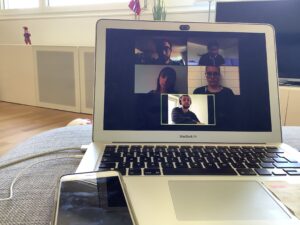Is this a wake-up call? Or are we allowing a new level of surveillance into our lives?
Reflecting on a week on and around Zoom

Everyday group meeting on Zoom captioned in a photo
As this week comes to an end, we can start to reflect on the challenges this virtual Summer School has posed on us. Still digesting the digital “bombardment” that guided our paths this week, we conclude that it was both a very challenging but also very fascinating process to work with and via the technology that dictates our every move – Zoom.
Starting from different approaches and perspectives on how digital technologies such as headphones, the television, Microsoft Teams, and Zoom effects our lives, we together embarked on a common journey to answer the question: how does the digital technology Zoom, changes the way we organize and the way we are organized in the current pandemic?
Digiphrenia (Rushkoff) partly hit us already after the first day’s lectures. Quickly we realized that we had to take responsibility to work hard to both process the information consumed through Zoom, and to work with the digital entanglement of Zoom. Using different academic methods and personal reflections, we tried to tear Zoom into pieces to put together a holistic picture. We were not aware of how hard it would be to constantly work with the medium that is in front of our faces, and through which we perceive each other every day from morning to evening. Following a contextual analysis of the technological, historical, and societal perspective, we tried to grasp the power of Zoom as a third party. Leaving us isolated, and without the luxury of normal human interaction, the technology poses an immense influential power onto our interactions, and the ability to build relationships. How did we come to accept this new normal in which the digital room of Zoom is not just a lecture but also the same classroom where you talk with your professors, you also meet your parents, talk gossip with your friends, go to the toilet, or date someone? And how could we break free and question this new normality? Then on Wednesday evening we experienced a breakthrough: with the “dancing class” we saw what was possible when we completely stepped out of the normal usage patterns exhibited on Zoom. Through this challenging task and the reinforcing workshop with Simon Denny, we were able to come up with the overall idea that we wanted to transport through our presentation:
We want to take students on a journey through this “new normal” and show them how much this deviates from our normal life and which affects not only the individual but also society can be observed.
The journey brought us to conclude six important aspects about Zoom that we want to explain and dissect to give a grasp of Zoom’s influence on our new normality:
Move away from the original purpose:
Zoom was intended to be a video-conferencing tool for the workplace. To replace in-person meetings and reduce traveling.
Change in Communication:
We are not able to use and understand body language, miss “heated” creative discussions and are finally left less satisfied with the outcomes.
Relationship Impact:
Personal relationships on an individual, spontaneous basis are less easy to form because we lack normal interaction (e.g. eating together).
Emotional Impact:
We feel anxious, lonely and little satisfied with what we do. For more check out this video one of our group members made: My emotions on Zoom
Third-party Relation:
Suddenly, even without being consciously perceived by us, there is a third-party player within our communication.
Power Play & Control:
While some artifacts of power are taken away (e.g. the corner office), overall there is a bigger bureaucracy with the scheduling and hosting of meetings. One host is in control of the others and can manage their reactions, while everybody can easily take videos or photos of the screen without the others knowledge.
The Corona crisis has thrown humankind in general, and we as students and professors into a temporary crisis – we are still not in a virtual classroom; we are actually in front of our screen looking and calling into the void. But this also offers a unique opportunity: either we can see this as a moment of realization and change, or the moment of accepting a new level of surveillance in our lives. Having had the opportunity to dive into the socio-technological entanglement of Zoom as part of our everyday life, we believe that we need more rules and adaptions in our use of Zoom and much more research on its impact and relevance. Thus, we want to call out to you! Wake up, reflect on your experience, and make a difference.
Thank you for reading. Thank you for the memories, your valuable insights, and the effort every one of you put into this week!
We know how tiring this week has been, so enjoy your long weekend, go out, meet people (if possible) and enjoy an Aperó. And always remember… even on Zoom, don’t be evil 😉
Love,
Alma, Bea, Davide, Karolina & Oskar
(For some lasting memory of Alma: Weird glitches on Zoom)
PS: For more information check out this collection of articles.
- On Zoom, and its impact in the current crisis:
- On the world after COVID-19:
- Some Zoom “glitches”:
- The straining effects of Zoom:
- How to handle Zoom fatigue: